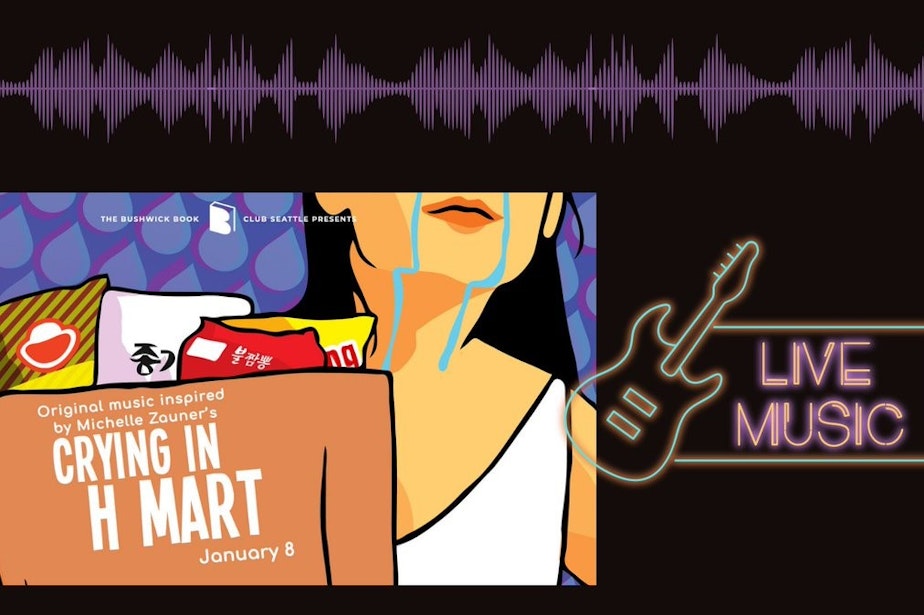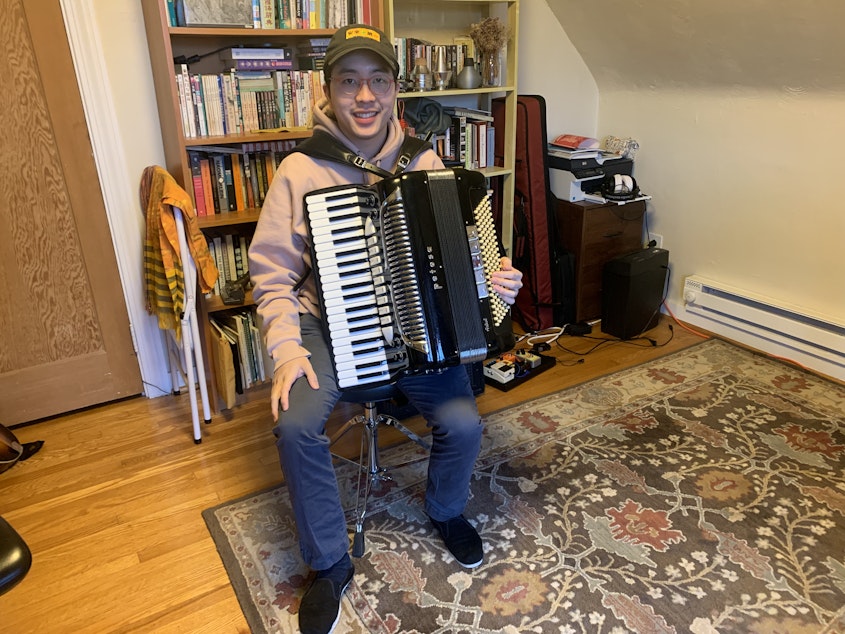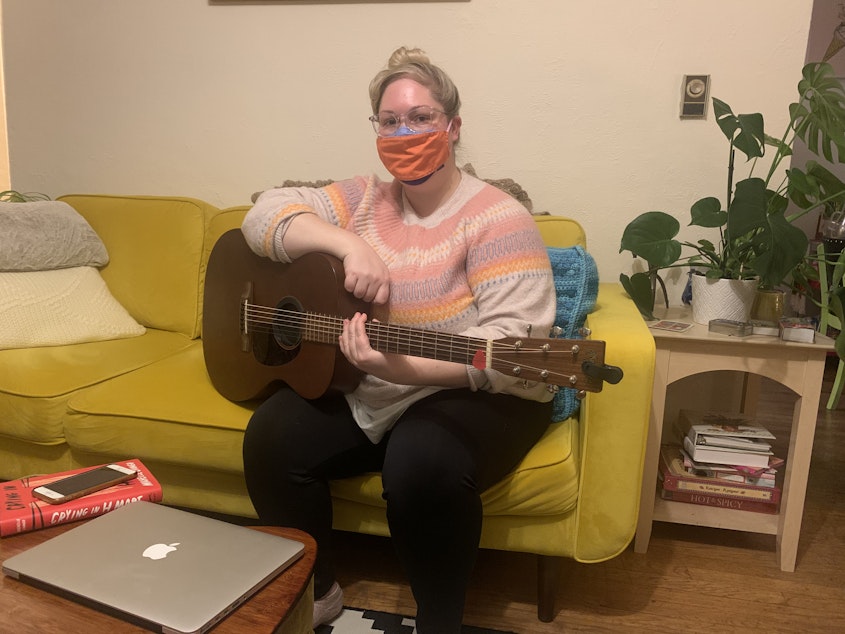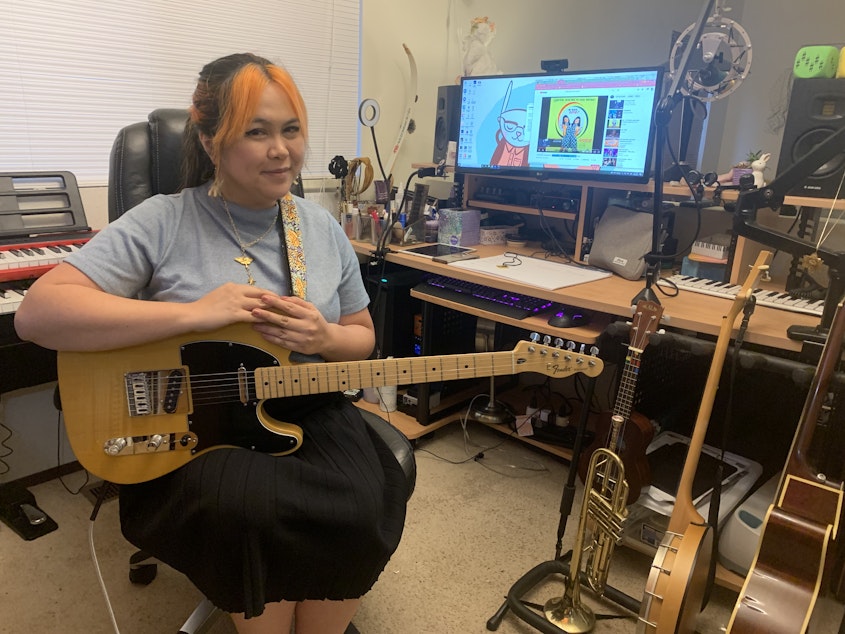The sound of 'Crying in H Mart'

Our connections to books can be deeply personal. We cling to the characters that feel like friends, or reflect pieces of ourselves.
But how do you translate your reading experience and the connections you feel with a book into music?
Earlier this month, a group of local Seattle musicians did just that, turning Michelle Zauner's bestselling memoir Crying in H Mart into original music for the Bushwick Book Club Seattle, a non-profit dedicated to increasing awareness in literature and song writing. They performed their songs at Town Hall Seattle.
Here's what the artists had to say about the parts of Michelle Zauner's memoir that spoke to them, and provided musical inspiration.
Josh Hou
In her memoir, Michelle Zauner chronicles her journey to explore her identity as a biracial Korean American. After her mother dies, she turns to food and cooking as a way to connect not just with her mother, but with her identity too.
Josh Hou relates to that journey. He grew up speaking Mandarin at home, but says he doesn't speak as fluently as he'd like to. Tutoring classes have helped.
Sponsored
"I wanted to capture the feeling of being cut off from your heritage and being frustrated. And there's like a sense of a deep sense of loss, because it should be yours. But then it also kind of never was. But it also always was at the same time," Hou said.

Jed Crisologo
Crisologo would keep notes of lines throughout the book that would hit him. One line in particular lingered in his mind.
"There was this kind of thing that Michelle's mom would say throughout the book, that was 'Save tears for when your mother dies' — that kind of just subconsciously became the device I used to frame what the song was going to end up being about," Crisologo said.
Sponsored
That line made him think about his own close relationship with his parents, and the "deep in the bones" influences they've had on who he is.
"[The song] is really about all the small things that are part of the people who are in the deepest relationships with you, and how those add up to who you end up being as a person, and how those small things end up being what you miss about someone."
Emily Persha
As the mother of two girls, Persha connected with Michelle Zauner's examination of her relationship with her own mom. The book made Persha wonder how her own ambitions and dreams will influence their relationships.
"The concept of identity and where we draw our identity from was really was really interesting to me from the book that I think I felt like I wanted to write about," Persha said.
Sponsored
The book also made Persha think about the pivotal moments in her life that mark a before and after.
Some of them, like moving to a new home, can be nerve-wracking and exhilarating. Other moments, like the death of a loved one, are frightening.
"There is, you know, these moments throughout our lives that are like pivotal moments, whether we know it or not, that mark like a significant before and after, " Persha said. "And oftentimes we know those moments are coming. Michelle knew her mom was about to pass away and knew like 'I am currently in this before and there's an after coming. I'm scared of that after.'"
Amanda Winterhalter
At the heart of Crying in H Mart is Michelle Zauner's relationship with her mother. The love they had for each other ran deep, but their different personalities created friction in their relationship.
Sponsored
"I think reading Michelle's story about her relationship with her mom made me reflect a lot on my relationship with my mom," Winterhalter said.
Winterhalter comes from a musical family and would spend Sundays sharing duets with her mother at church. But as she became an adult and developed independence, Amanda's relationship with her mother shifted.
"The dynamic is always kind of changing, or like our proximity or sense of closeness or attachment. There's a little bit of a fluidity to it."

Drea Marilyn
Sponsored
Like Crisologo, Drea Marilyn also found inspiration in a line from Crying in H Mart.
"I remember her saying 'guttural,' the guttural yelling and the screaming of mourning on the two tongues, Marilyn said.
It brought Marilyn back to October 2021, when she traveled back home to California to say goodbye to her grandmother. She knows what it's like to mourn in two tongues.
"I'm Filipino. But I'm also American. And in some settings, I'm more Filipino and other settings and more American. But nonetheless, in these two languages, I'm still calling for you."

Nic Masangkay
For Nic Masangkay, the generational divide Michelle Zauner details in her memoir deeply resonated.
It reminded them of the discussions they've had with other millennial Filipino Americans.
"We have parents and grandparents who are like, 'We worked this hard so that you can have a better life.' And so 'You have it easier' is the narrative and an almost assumption," Masangkay said.
"But we also have our own difficulties too. So to be in conversation with sometimes conflicting stories, of 'you have it easier?' Oh, no, we don't. I think that's a deep thing that I relate to, with how Michelle honors writing it in her own Asian American experience."
Sheryl Wiser
For Wiser, Crying in H Mart came into her life at a pivotal time. Her mother is currently in hospice care in New Jersey, and Zauner's memoir has served as a primer for the grief she knows is on the horizon.
"She was so deeply involved with the care of her mother, particularly in those final weeks," Wiser said. "And so it's heartbreaking and instructive and illuminating, to be reminded of what grief is, and the impact of it, and it's not. It's not here's your three days — get over it."
She says the book left her with a lot to examine. What is the relationship between mothers and daughters? What does it mean to recognize your mother as an individual, and beyond just the role of mother?
"I think it gave me some language and some perspective on loss," Wiser said. "Particularly loss that is around the loss of the mother, and what is ahead for me. It's definitely a book I'm going to be keeping close in the days ahead."

